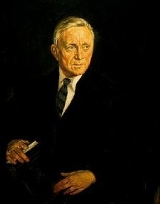
of the United States Supreme Court. With a term lasting 36 years and 209 days, he is the longest-serving justice in the history of the Supreme Court. In 1975, a Time
article called Douglas "the most doctrinaire and committed civil libertarian ever to sit on the court."
During that time, he also established the records for the most opinions written, the most dissents written, the most speeches given, and the most books authored by any member of the Supreme Court.
The whole, though larger than any of its parts, does not necessarily obscure their separate identities.![]()
Absolute discretion is a ruthless master. It is more destructive of freedom than any of man's other inventions.![]()
Our recent decisions make plain that we do not sit as a super-legislature to weigh the wisdom of legislation nor to decide whether the policy which it expresses offends the public welfare.![]()
We need to be bold and adventurous in our thinking in order to survive.![]()
We are a religious people whose institutions presuppose a Supreme Being. ![]()
The right to be let alone is indeed the beginning of all freedom.![]()
All executive power — from the reign of ancient kings to the rule of modern dictators - has the outward appearance of efficiency.![]()
The critical point is that the Constitution places the right of silence beyond the reach of government. ![]()

